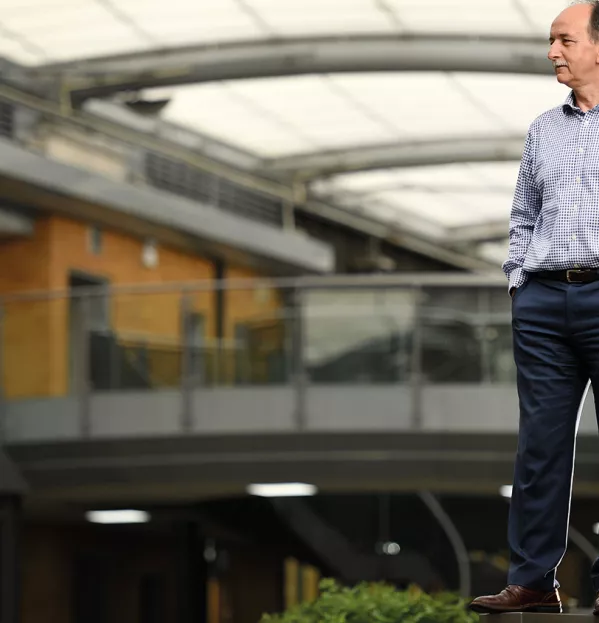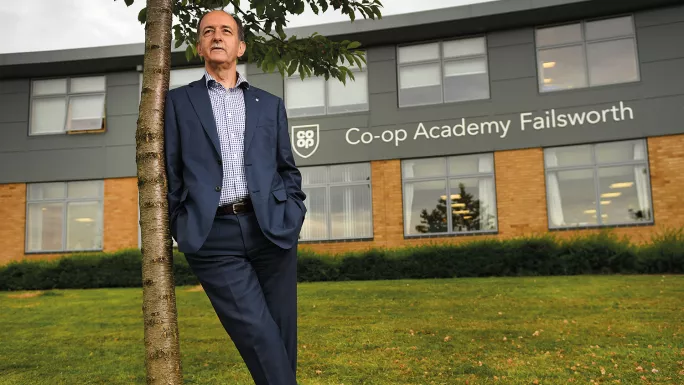
‘We see schools as vehicles for regenerating communities’

Frank Norris is perhaps not what you might you expect as the boss of an academy trust that has bold plans to become the biggest chain in the North of England.
And he seems delighted when this is suggested. “I know what you are going to say. I am not like the others,” he laughs.
He is softly spoken and unassuming, but also ambitious about what the Co-op Academies Trust - the UK’s largest corporate sponsor of academies - can achieve.
Throughout our conversation, the 62-year-old is keen to downplay his own importance.
The interview doesn’t take place in his office - because he doesn’t have one. He doesn’t even have his own desk. Like the thousands of other employees at the Co-op headquarters in Manchester, he hot-desks. And he does not identify himself as a figurehead.
Nonetheless, Norris brings a wealth of educational leadership experience to the role that he describes as the “best job he has ever had”. The trust runs 12 academies - including primary and secondary schools - in Greater Manchester, Stoke-on-Trent and Leeds.
Struck down at school
His route to trust director has been a varied one, involving working in a bank, as a primary school teacher and head, as a senior Ofsted inspector and a council school improvement adviser. While many of his peers can describe how their own schooling set them up for a career in education, Norris’ journey was shaped by the way his own time at school came to an abrupt end.
As a sporty 15-year-old, growing up in Essex, he had been selected to play for the first team of his local cricket club, alongside former England internationals Trevor Bailey and Tom Graveney. To be chosen to play for this team at 15 was a big deal.
But in the days building up to his first match, he suffered a spontaneous haemothorax.
“It is a condition where air in the lung escapes into your chest,” he explains. “I was walking up the steps at the school two or three days before my first game, and I felt as though I was having a heart attack.”
His life was to change. His lungs collapsed and he went into hospital five or six times over an 18-month period. He missed half of his first year of sixth form at Westcliff High School for Boys, a grammar school in Essex, and was told he would need to start over.
He recalls how his father expected him to join him at Ford’s radiator plant in Basildon, but Norris knew that this wasn’t for him.
“I decided to leave [school],” he says. “I went into the careers advice service on Thursday and had a job in the bank on Monday.”
The ordeal had changed the direction of his life and made a lasting impression. “It did make me feel that life was for living,” he says.
But, first, Norris felt that he needed a solid career path, so he started attending evening classes to obtain his banking qualifications.
He reflects: “It’s interesting when I look at evening classes now: they are about flower arranging and conversational Spanish. In those days, I was with 30 other people who wanted to get their banking qualifications.”
Instead of securing him a long-term career, however, Norris’ banking exams allowed him to obtain a university place to do his teacher training. Why the switch?
It’s another story that revolves around a sports team. While travelling back from a football match on the bank’s team bus, he was struck by the energy levels of his older colleagues’ children.
He says: “It was just one of those moments where I thought, ‘Blimey, there is so much energy here, isn’t there?’ Which I wasn’t getting in the bank…it wasn’t that same buzz.”
His mother was less than thrilled about his decision to go into teaching - but he had made up his mind.
Competitive edge
Within six years of starting out in the profession, Norris had his first headship, and after serving as head at two primaries in the North West, he went on to a senior role at Ofsted.
“I was always competitive,” he says. “The sport in me makes me competitive. If you were my boss, I would want your job. I was a deputy head boy at school and I have always taken on leadership roles.”
Norris had moved from Essex to the North West when he met his wife-to-be, and spent all of his teaching career there. He now has three grown-up children - two of whom have gone into teaching.
His commitment to education comes across throughout the interview. He speaks about the importance of ensuring that young people have a broad education, about creativity and the arts, and how Co-op pupils will be well-placed in job interviews.
But perhaps the topic he speaks most passionately about is his time at Ofsted.
Norris spent a year’s secondment with the inspectorate after being the headteacher of one of the first schools in the country to undergo an inspection.
He says: “There were hordes of inspectors. They were into everything at the school - it lasted a week.”
Far from being daunted by his first taste of Ofsted, he became immersed in it.
During his secondment year with the inspectorate, he worked with Miriam Rosen, who would go on to briefly lead the organisation. He describes her as his mentor and the biggest influence on his career.
“She was relentless,” he says. “She taught me to look for the evidence and to always question what staff were telling you.”

Norris returned to his school but was soon drawn to work for Ofsted full-time. “I was seen as having gone to the dark side,” he says.
However, he is positive about his time there, and proudly claims it was his idea to call the very best schools’ category “outstanding”, despite current calls for Ofsted to scrap the label amid fears it is allowing schools to coast.
Norris says: “We saw ‘outstanding’ at that time as something you would travel 20 miles to go and see - it was not something that was going to be two a penny. So these were the beacons of excellence that would, in effect, be a centre of excellence for a town or a region.”
But he recognises some of the criticisms about Ofsted not taking account of schools’ individual circumstances, and believes inspectors need to have led schools in deprived communities in order to understand them.
He speaks from experience; at his first school in Partington, Greater Manchester, there were only eight pupils who were not on free school meals.
Norris says: “When you’re an outlier, where you have 70 different languages being spoken in your academy, as we do in our academy in Leeds, the context of that community is probably beyond most headteachers’ comprehension. So, not decrying the people who are drawn in to work for Ofsted, but actually if they are drawn primarily from ‘outstanding’ and ‘good’ schools, the chances are that they’re not going to be working in deprived areas. I have said that to [Ofsted national director of education] Sean Harford.”
Norris wants the Co-op to be running 40 schools by 2022 - all based in deprived communities. The focus, he says, is not just on raising standards, but on doing that because of what it will mean for the communities that the schools serve. In essence, the reason why the Co-op got involved in academies in the first place was about regenerating communities,” he says. “It wasn’t about the school. The school is a vehicle for regenerating the communities it serves.”
You need a Tes subscription to read this article
Subscribe now to read this article and get other subscriber-only content:
- Unlimited access to all Tes magazine content
- Exclusive subscriber-only stories
- Award-winning email newsletters
- Unlimited access to all Tes magazine content
- Exclusive subscriber-only stories
- Award-winning email newsletters
You need a subscription to read this article
Subscribe now to read this article and get other subscriber-only content, including:
- Unlimited access to all Tes magazine content
- Exclusive subscriber-only stories
- Award-winning email newsletters
- Unlimited access to all Tes magazine content
- Exclusive subscriber-only stories
- Award-winning email newsletters